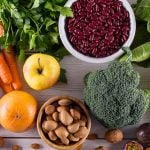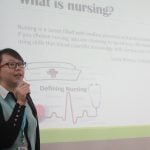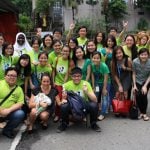As the importance of studying human health in connection with the environment and animal health gains traction, the health sciences is to be the perfect platform to bring them all together. Prof Anna Ling, Dean of the School of Health Sciences, talks about the dynamic nature of the health sciences.
Health science is a wide and dynamic field. It is a place where scientific principles intersect with practical applications to support the health and well-being of communities. It helps us understand how social and environmental factors affect our health and play a crucial role in a time where chronic diseases are on the rise and widespread health threats such as pandemics are not as far-fetched as we once thought.
“In biotechnology, we are at the forefront of scientific discoveries,” says Prof Anna Ling, Dean of the School of Health Sciences (SOHS) at IMU. Research in the field, she says, is what made possible pivotal discoveries such as the mRNA technology that was used to produce the COVID-19 vaccine.
All Under One Health
A biotechnologist influenced profoundly by the dedication and commitment of world-renowned scientists from the Massachusetts Institute of Technology (MIT), USA, with whom she worked with during her PhD studies under the Malaysia-MIT Biotechnology Partnership Programme (MMBPP), Prof Ling has consistently pursued research that aimed at making a significant impact on both the scientific community and the global population.
This commitment is illustrated in her current research, diving deep into an area that will help to bolster food security locally – and extends globally through her collaboration with Malaysian Nuclear Agency, and international agencies such as Forum for Nuclear Cooperation in Asia (FNCA) and International Atomic Energy Agency (IAEA). It centres around finding a rice variety with a shorter harvest time and a higher yield. She explains that a shorter harvest time reduces the risk of the crop being damaged by extreme weather events such as flash floods and droughts. Finding such a variety has become increasingly urgent as climate change increasingly affects the sustainability of our food sources.
An inadequate food supply causes malnutrition, leading to various human, animal and environmental health issues. It is a perfect example of the systemic thinking embodied in One Health. One Health is defined by the World Health Organization as “an integrated, unifying approach that aims to sustainably balance and optimise the health of people, animals and ecosystems.”
According to Prof Ling, the School’s research projects have always been built on the concepts of One Health. One such example is the ongoing research on algae and its utility in modern biotechnology industries. The algae research brings together human health and environmental factors as it focuses on heavy metal pollution and how it affects the ecosystem, she says. The school is working to incorporate more environmental and sustainability topics into its curriculum, and in the future, Prof Ling hopes, they will also be able to include areas that address animal health, such as animal vaccines.
IMU, A Unique Experience
At the IMU, the SOHS houses a synergistic range of programmes –Dietetics with Nutrition, Nutrition, Biomedical Science, Medical Biotechnology and Nursing. Students who join the SOHS can leverage this interdisciplinary culture and will also be privy to some unique opportunities.
In 2023, the Dietetics and Nutrition Department launched the IMU Student Dietetics and Wellness Clinic – the country’s first free student-led dietetics clinic. The clinic offers individual dietary consultations to people with specific medical conditions. The innovative arrangement sees final-year dietetics students as ‘owners’ of the clinic who are responsible for managing and running it. This gives them exposure to a range of patients and increases their practical experience:
“When students get placements during their studies, it doesn’t guarantee that they will have the opportunity to see a full range and variety of cases. However, at the clinic, they are able to get this experience and exposure,” Prof Ling says. She explains that as it is a free service clinic, they are able to attract many members from the local community as well as invite specific groups to the clinic. The clinic, set up in 2023, has been so successful that other universities, have come to learn about its setup.
A second exciting initiative has been the entrepreneurial module inculcated into the school. “Students today need to be well-rounded – and not just experts in science. Many students are interested in business but don’t know where to start,” says Prof Ling. In the SOHS, entrepreneurship is a module taken by all students, including those in the nursing programme.
Embedded in the modules is an entrepreneurship challenge where students get to attend workshops conducted by industry players and pitch business plans based on ideas formed during the module. Judging panels are made up of industry members and IMU faculty. “I was amazed with some of the ideas,” says Prof Ling. The entrepreneurship modules started in 2021, and students from the different health science programmes come together during this module – giving them a chance to build inter-discipline collaborations.
Blazing into the Future
A dynamic faculty spearheads the school and are themselves key opinion leaders in their industries. From holding leadership positions outside of the university, such as in the Malaysia Dietitians’ Association and on Nursing Board, the faculty have an impressive track record, including securing research grants of more than a million ringgit.
Moving ahead, Prof Ling plans to further develop the research profile of her faculty and increase the school’s collaborative work with international universities and top researchers. Currently, the Biomedical Science and Medical Biotechnology programmes are the most active in research, and Prof Ling would like to focus on developing research under the Dietetics and Nutrition as well as Nursing programmes. “Nursing is naturally very clinical based,” she says, explaining that developing its research side would be a way to add to the nursing faculty’s distinction.
Her vision is for all the departments to be active in teaching, clinical practice and research. “This will help to drive us to be in the top 500 in QS rankings by 2025,” she says.
Prof Ling also pushes the School to continuously innovate its curriculum and keep it updated. She gives an example of data science that emerged in the last few years as a new focus, and that has been incorporated into the curriculum at IMU. Close ties to industry partners also ensure the curriculum is relevant and useful. “Our industry partners have reassured us that our curriculum has stayed relevant to their needs,” says Prof Ling.
Challenge Yourself
At the SOHS, Prof Anna challenges her students to demonstrate critical thinking skills and to see things from a more global perspective. “Go out and see things in the outside world,” she says. She adds that global exposure will give them an edge and make them work-ready in any situation. Another aspect she feels is important is communication skills. “We need to develop our face-to-face communicating and interacting skills,” she says.
Her advice to students and faculty alike: “Have an open mindset to new changes and new technologies. This will make you versatile. Don’t restrict yourself by dwelling on things you cannot do. Be independent – you cannot expect others to solve your problems. And most importantly, support others.”
About Prof Anna Ling
Prof Ling took up her role as Dean of the SOHS in January 2023, after serving as Associate Dean for the previous three years. She was drawn to academia because she didn’t want her knowledge to become static, and she wanted to share it with the younger generation. “As an academician, you will have two different lives – teaching and research. It makes life more diversified!” she says.
When Prof Ling first entered university, biotechnology was a focus of the Malaysian government. Discoveries such as DNA were pushing the area of study into the limelight, and new inventions and concepts were coming into the country. “It was a popular course that was being offered at the public universities, and I managed to get into the programme,” she recalls.
Ever since then, she has fallen in love with the dynamic nature of the field, explaining that in biotechnology, one plus one doesn’t always need to be equal to two. “The opportunities and potential are endless,” she says.









